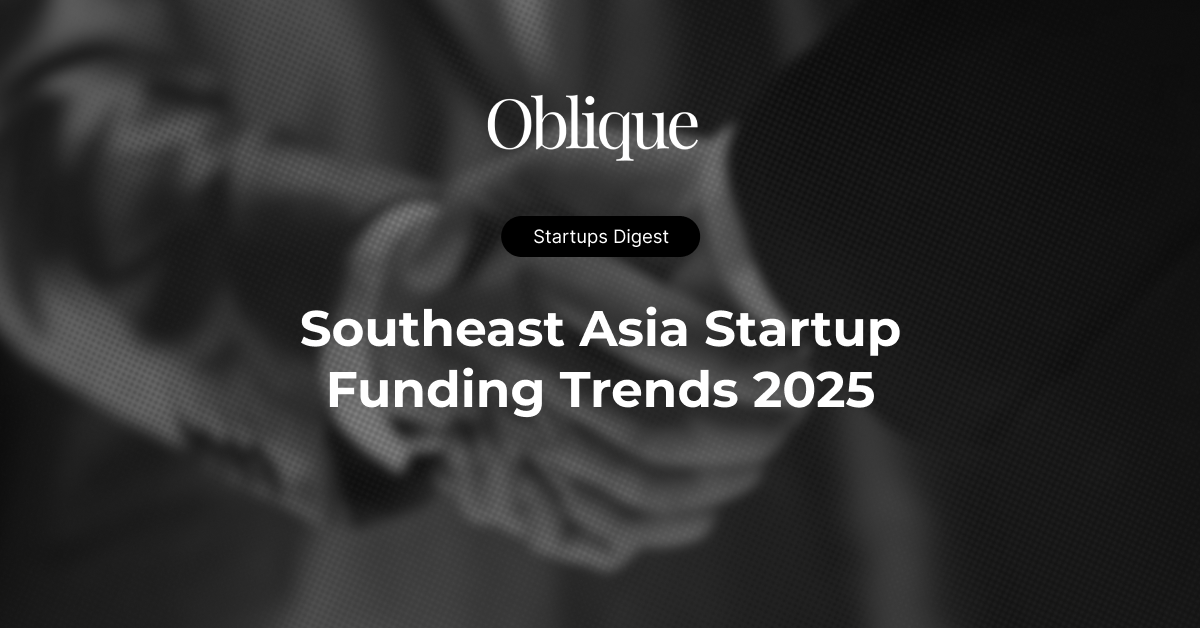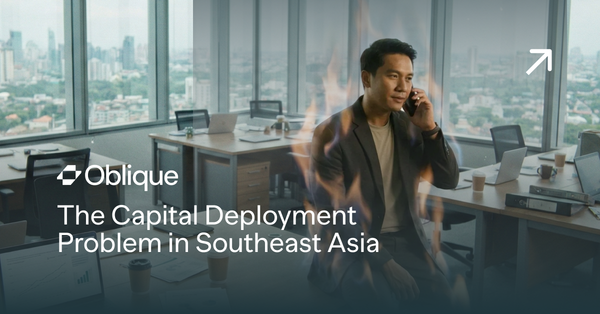Southeast Asia Startup Funding Trends 2025: What Founders Need to Know
Southeast Asia’s startup funding hit $2B in H1 2025, up 7% YoY, but capital flows have shifted. Late-stage deals surged 140% as seed funding halved, with Singapore taking 92% of the pie. Fintech, AI, and climate tech dominate—profitability and capital efficiency now lead investor priorities.

After a challenging funding winter that began in 2022, Southeast Asia's startup ecosystem is showing tentative signs of recovery in 2025. The region raised $2 billion in the first half of 2025, marking a 7% year-over-year increase—a modest but meaningful rebound that signals the market may be finding its footing. However, beneath this headline figure lies a fundamentally transformed funding landscape that demands strategic adaptation from founders seeking capital.
The data tells a compelling story of market maturation. While overall funding volumes are stabilizing, the distribution of capital has shifted dramatically toward late-stage companies with proven business models, leaving early-stage startups facing a more challenging environment than ever before.
2025 Funding Landscape Overview
YoY Funding Volume and Stage Distribution
The first quarter of 2025 demonstrated resilience with $909 million raised across 113 deals, representing a 7% year-over-year increase. This recovery momentum continued through the first half, though with considerable volatility. May witnessed a 92% month-over-month surge to $656 million, driven primarily by large private equity investments, while July experienced a sharp 77% decline to just $68 million.
The most striking transformation has occurred in funding stage distribution. Late-stage funding surged 140% in H1 2025 compared to H2 2024, reaching $1.4 billion. This late-stage resurgence represents a clear pivot from early-stage experimentation toward backing proven, scalable business models. In stark contrast, seed-stage funding collapsed by 50% to $50.7 million, while early-stage funding dropped 27% to $167 million.
This shift reflects what industry observers call an "ecosystem maturity" trend, where investors like East Ventures, 500 Global, and Wavemaker Partners are recalibrating their theses toward growth-stage winners.
Country-by-Country Breakdown
Singapore's dominance has reached unprecedented levels, attracting 92% of SEA's funding in H1 2025 and 88% of the region's fintech funding specifically. The city-state's magnetic pull for capital stems from its business-friendly environment, robust infrastructure, and policy support, but this concentration poses risks for regional diversity and resilience.
Indonesia, traditionally the second-largest market, captured only 8% of regional funding, while Vietnam maintained its position as the region's third-largest startup ecosystem with 6% of deal value. The data reveals that Vietnamese startups received $529 million in total funding in 2023, maintaining third position in Southeast Asia, with healthcare seeing a remarkable 391% growth and education up 107% year-over-year.
Malaysia and Thailand each secured modest shares, with emerging hubs like Jakarta and Thu Duc receiving just $28 million in Q1—highlighting the stark geographical concentration of venture capital flows.
Key Shifts Driving Investor Behavior
Sector Priorities for 2025
Fintech continues its reign as the dominant sector, with Southeast Asian fintech companies raising $776 million in H1 2025, representing a 31% increase from H2 2024. However, this growth was almost entirely driven by three mega-deals: Thunes ($150M Series D), Airwallex ($150M Series F), and Bolttech ($147M Series C), which accounted for over half of all fintech funding in the region.
Artificial intelligence has emerged as a breakout sector, with AI startups witnessing 217% growth and SaaS companies experiencing 262% expansion. The e-Conomy SEA report highlights that 71% of businesses see ROI on their GenAI investments within 12 months, driving investor confidence in AI-enabled business models.
Climate tech represents another high-growth vertical, with the sector raising $725 million in venture capital funding, led by Indonesia accounting for 67% of this total. The share of climate tech deals in Southeast Asia's venture funding grew from 3.2% in 2019 to 9.5% in 2023, with climate tech equity deals increasing at over 15% CAGR.
Impact of Regulatory and Market Forces
The funding landscape transformation reflects broader macroeconomic and regulatory shifts. Global private capital rotated into safer, more liquid assets, creating what industry experts describe as a seven-year low in Southeast Asian VC fundraising. Only eight VC funds reported fundraising milestones in H1 2025, down from 17 in the prior semester.
Regulatory frameworks across the region remain fragmented, with investors struggling to navigate inconsistent policies across countries. However, governments are stepping up support through initiatives like the ASEAN Plan of Action for Energy Cooperation (APAEC), which prioritizes renewables and clean infrastructure, helping to de-risk climate tech investments.
The market has also witnessed a fundamental shift in investor expectations. As Lightspeed Venture Partners noted, investors would remain bullish on Southeast Asian startups in 2025, largely due to early adoption of AI, digital finance, and sustainability technologies, but only for companies demonstrating clear paths to profitability.
What This Means for Founders
Fundraising Strategies in a Tight Capital Environment
The current environment demands a laser-sharp focus on profitability over growth-at-all-costs. As one industry report emphasized, the era of "just another AI tool" is over, with investors now prioritizing companies that use AI to tackle complex, real-world challenges and deliver measurable impact.
For early-stage founders, the advice is stark but clear: this "quiet period" in early-stage funding could be the best time to invest before the next spike in valuations, as angels have more negotiating power and a wider surface area to explore. However, founders must prepare for longer fundraising cycles and more rigorous due diligence.
Capital efficiency has become paramount. The most successful startups in 2025 are those that have focused on increasing revenue sustainably, with many implementing new revenue streams such as advertising becoming a viable form of additional revenue and subscription models becoming potent revenue generators.
Positioning for Late-Stage Interest
Late-stage investors are seeking companies with solid business fundamentals (39%), clear exit strategies (37%), and attractive entry multiples (32%). The success stories emerging from 2025 share common characteristics: proven market traction, efficient unit economics, and demonstrated ability to achieve profitability.
Southeast Asian startups can build large valuation companies at scale if founders and investors reset their expectations about the region. The key insight here is that while Southeast Asia may not have market potential similar to China and India, it offers unique advantages including lower operational costs and access to diverse talent pools.
For founders positioning for late-stage rounds, the data suggests focusing on sectors with proven investor appetite: fintech infrastructure, AI-enabled enterprise solutions, and climate tech applications. The region's early adoption of GenAI, with 71% of businesses seeing ROI within 12 months, presents particularly compelling opportunities for founders building AI-first products.
The exit environment, while challenging, shows signs of improvement. Despite a global liquidity crunch, SEA dominated exits in emerging venture markets, accounting for 42% of total exits despite recording 28 exits in 9M'24, a 26% decline from the previous year.
Conclusion
Southeast Asia's startup funding landscape in 2025 reflects a maturing ecosystem where quality trumps quantity and profitability takes precedence over growth-at-all-costs. While the 7% year-over-year funding increase signals recovery, the dramatic shift toward late-stage investments and the concentration of capital in Singapore underscore the need for strategic adaptation.
The most successful founders in this environment will be those who demonstrate clear paths to profitability, leverage AI and climate tech trends, and build sustainable business models from the ground up. Early-stage founders face headwinds but should view this period as an opportunity to build stronger fundamentals before the next funding cycle.
As global investors continue to see Southeast Asia as a key growth market—evidenced by AI's potential to add $1 trillion to SEA GDP by 2030—the region remains poised for long-term success. The question for founders is not whether opportunity exists, but whether they can build businesses that meet the evolved expectations of an increasingly sophisticated investor base.





